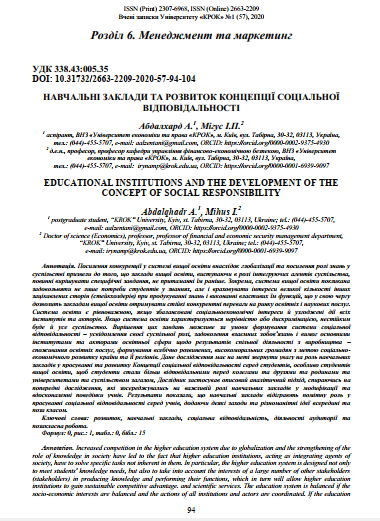НАВЧАЛЬНІ ЗАКЛАДИ ТА РОЗВИТОК КОНЦЕПЦІЇ СОЦІАЛЬНОЇ ВІДПОВІДАЛЬНОСТІ
DOI:
https://doi.org/10.31732/2663-2209-2020-57-94-104Ключові слова:
розвиток, навчальні заклади, соціальна відповідальність, діяльності аудиторії та позакласна роботаАнотація
Посилення конкуренції у системі вищої освіти внаслідок глобалізації та посилення ролі знань у суспільстві призвели до того, що заклади вищої освіти, виступаючи в ролі інтегруючих агентів суспільства, повинні вирішувати специфічні завдання, не притаманні їм раніше. Зокрема, система вищої освіти покликана задовольняти не лише потреби студентів у знаннях, але і враховувати інтереси великої кількості інших зацікавлених сторін (стейкхолдерів) при продукуванні знань і виконанні властивих їм функцій, що у свою чергу дозволить закладам вищої освіти отримувати стійкі конкурентні переваги на ринку освітніх і наукових послуг. Система освіти є рівноважною, якщо збалансовані соціальноекономічні інтереси й узгоджені дії всіх інститутів та акторів. Якщо система освіти характеризується нерівністю або дискримінацією, нестійким буде й усе суспільство. Вирішення цих завдань можливе за умови формування системи соціальної відповідальності – усвідомлення своєї суспільної ролі, задоволення взаємних зобов’язань і вимог основними інститутами та акторами освітньої сфери щодо результатів спільної діяльності з виробництва – споживання освітніх послуг, формування всебічно розвинених, високоморальних громадян з метою соціально-економічного розвитку країни та її регіонів. Дане дослідження має на меті звернути увагу на роль навчальних закладів у просуванні та розвитку Концепції соціальної відповідальності серед студентів, особливо студентів вищої освіти, щоб студенти стали більш відповідальними перед колегами та друзями та родинами та університетами та суспільством загалом, Дослідник застосував описовий аналітичний підхід, спираючись на попередні дослідження, які зосереджувались на важливій ролі навчальних закладів у модифікації та вдосконаленні поведінки учнів. Результати показали, що навчальні заклади відіграють помітну роль у просуванні соціальної відповідальності серед учнів, додаючи деякі заходи та різноманітні ідеї всередині та поза класом.
Завантаження
Посилання
Zidan, A. (1993), A measure of the trend towards social-self responsibility for children and adolescents, Science Journal, Helwan University, retrieved from : https://www.mobt3ath.com/uplode/book/book-1432.pdf.
Alzyoud, S. (2015), Social responsibility in higher education institutions ph.d : application case from the middle east, Department of Community and Mental Health Nursing, The Hashemite ,University, oman , Jordan, retrieved from : http://eujournal.org/index.php/esj/article/viewFile/5259/5070.
Hassan, S. (2003), Curriculum between theory and practice, Cairo: Dar Al-Arabiya Book Library, Cairo, Egypt.
Walid, B. M. (1999), Effectiveness of extension programs to develop social responsibility with some of the students who are behaviorally disordered in different educational stages, Master Thesis, Faculty of Education, Alexandria University.
Syed, S. (1980), Religious counseling and its relationship to social responsibility of adolescents in educational institutions, Medina, Saudi College of Education.
Moral thinking and its relationship to social responsibility and some variables among university students, Master Thesis, Islamic University, Gaza.
Muhammad, Al-Shafii (1992), Responsibility and reward in the Holy Quran, Cairo: Muhammadiyah Sunna Press.
Walid, Al-Kharashi, (2004), The role of student activities in developing social responsibility, Master Thesis, Department of Social Studies, Riyadh College: King Saud University.
Al-Badri, Abdul Rahim (2006) Problems of University and Higher Education in Libya, Research. Benghazi, Libya:: National Book House.
Muhammad, Al-Khawaldeh (1987), The concept of responsibility among university youth in Jordanian society, and an invitation to teach responsibility in schools, The Arab Journal of Humanities, retrieved from : https://journals.squ.edu.om/index.php/jass/article/download/1050/1025.
Luestein, J. (1982), Developing Responsible learning behavior through peer Dissinteraction, ALS, retrieved from : https://scholar.google.com.ua/scholarq=Bluestein+Developing+Responsible+learning+behavior.
Abdullah, Al-Dammas (2011), An invitation to include social responsibility principles in educational curricula, retrieved from : http://www.al-jazirah.com/2012/20120427/ln12.htm.
Mendez, M. (2012), University Social Responsibility: Balancing Economic & Societal Benefits of University Research, The Journal of Science Policy & Governance, retrieved from : http://www.sciencepolicyjournal.org/uploads/5/4/3/4/5434385/_university_s ocial_responsibility.
Kazim, S. (2013), Developing the concept of social responsibility in educational institutions, Bagdad, Iraq, retrieved from : http://montdatarbawy.com/show/122843.
Saleh, F. (2019), Extra-curricular activities, Educational Center for Research and Development, Journal of Cultural Papers, Beirut.


